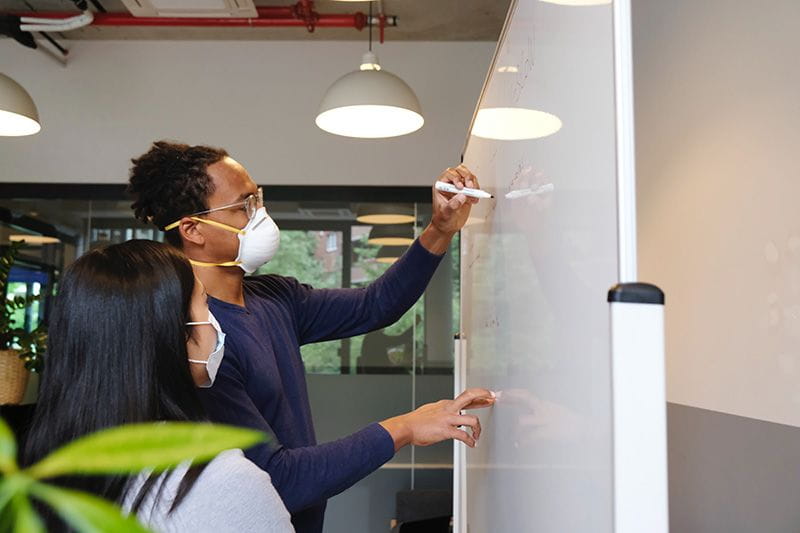The Human Resource Executive Benefits (HRE) Conference is one of the few sure things in Las Vegas. It's where human resources professionals (and the vendors who love them) catch up with the latest trends in benefits. Since not everyone could be there, we've boiled it down to three recurring takeaways - be stealthy, wealthy, and wise.
Stealth, in fact was a theme at a lot of conference sessions, covering everything from wellness to benefits selection to money.
In her accurately named session about wellness ("How Not Calling it 'Wellness' can Be Your Secret Weapon"), Author Laura Putnam said the best way to encourage healthy habits...is to pretend you're talking about something completely different. Instead of a wellness class with free kale, she said, build healthy habits organically into initiatives like walking meetings and team-building that includes physical exercise.
Same for fiscal fitness. In a session about money, one panelist talked about folding important information - discussions about benefits and the importance of healthy savings habits - into new employee orientations, an approach that dramatically raised 401k participation rates at her organization.
Another stealthy maneuver? Take a page from the book "Nudge" and shift benefits elections from opt-out to opt-in. Most people just go along with the default, said one panelist, and never see the stealthy underpinning behind what got them there.
That might not seem meaningful across the board, but conference attendees assured it was an issue throughout the workforce. A Sun Trust/Harris poll showed that about 25% of those making more than $100,000 a year still live paycheck to paycheck.
Such financial instability is weighing heavily on employers who are wondering if their people will have the resources to expand important skill sets by going back to school. No surprise that attendees asked a lot about pending legislation making student loan repayment a tax-free benefit. Two bills before the house and senate are rapidly gaining sponsors, meaning there are potential opportunities ahead.
Today's predominant Millennial, for example, isn't the ambitious 25-year-old with four roommates and a Snapchat habit, but more likely a 37-year-old working mom with a couple of preschoolers and a child care problem. Such misassumptions (and a study by Willis Towers Watson's John Bremen shows there are many) are fueling unwise benefits choices and poor use of resources. John's advice for CHROs: start thinking about benefits for Gen Z now - they're already in your workforce.
That said, don't forget your Gen X employees. A particularly surprising (and depressing) revelation was that the "Friends" gang is no longer the fresh-faced coffee guzzlers of the show's heyday, but rather 50-somethings with aging parents. Consumer Technology Association's Shelly Walser pointed to that as a sign we need to be less consumed with just young employees, and more attentive to things like elder care (employees in the sandwich generation will need it) as well as the needs of older employees themselves.
The assessment will be worth the effort; and it's a whole lot better than rolling the dice and hoping for the best.
Be Stealthy
Want to have a real impact on your employees? Your best bet may be to go under the radar.Stealth, in fact was a theme at a lot of conference sessions, covering everything from wellness to benefits selection to money.
In her accurately named session about wellness ("How Not Calling it 'Wellness' can Be Your Secret Weapon"), Author Laura Putnam said the best way to encourage healthy habits...is to pretend you're talking about something completely different. Instead of a wellness class with free kale, she said, build healthy habits organically into initiatives like walking meetings and team-building that includes physical exercise.
Same for fiscal fitness. In a session about money, one panelist talked about folding important information - discussions about benefits and the importance of healthy savings habits - into new employee orientations, an approach that dramatically raised 401k participation rates at her organization.
Another stealthy maneuver? Take a page from the book "Nudge" and shift benefits elections from opt-out to opt-in. Most people just go along with the default, said one panelist, and never see the stealthy underpinning behind what got them there.
Be Wealthy
Money keeps a lot of people up nights. And the big number repeated often at the three-day conference was the Federal Reserve Board's stat showing that nearly half of households in the country couldn't come up with $400 in an emergency.That might not seem meaningful across the board, but conference attendees assured it was an issue throughout the workforce. A Sun Trust/Harris poll showed that about 25% of those making more than $100,000 a year still live paycheck to paycheck.
Such financial instability is weighing heavily on employers who are wondering if their people will have the resources to expand important skill sets by going back to school. No surprise that attendees asked a lot about pending legislation making student loan repayment a tax-free benefit. Two bills before the house and senate are rapidly gaining sponsors, meaning there are potential opportunities ahead.
Be Wise
Think you know who your workforce is? Think again. Turns out most of us are alarmingly out of sync with the shift taking place under our own noses - to the detriment of our HR strategies.Today's predominant Millennial, for example, isn't the ambitious 25-year-old with four roommates and a Snapchat habit, but more likely a 37-year-old working mom with a couple of preschoolers and a child care problem. Such misassumptions (and a study by Willis Towers Watson's John Bremen shows there are many) are fueling unwise benefits choices and poor use of resources. John's advice for CHROs: start thinking about benefits for Gen Z now - they're already in your workforce.
That said, don't forget your Gen X employees. A particularly surprising (and depressing) revelation was that the "Friends" gang is no longer the fresh-faced coffee guzzlers of the show's heyday, but rather 50-somethings with aging parents. Consumer Technology Association's Shelly Walser pointed to that as a sign we need to be less consumed with just young employees, and more attentive to things like elder care (employees in the sandwich generation will need it) as well as the needs of older employees themselves.
Final Word from HRE: Don't Gamble with Your HR Strategy
The overarching takeaway is unmistakable: to be successful in the years ahead, we as employers are going to have to abandon what we think we know about our workforces and dig in to find out who our people really are. And to have an impact, we're going to have get creative about how we respond.The assessment will be worth the effort; and it's a whole lot better than rolling the dice and hoping for the best.





